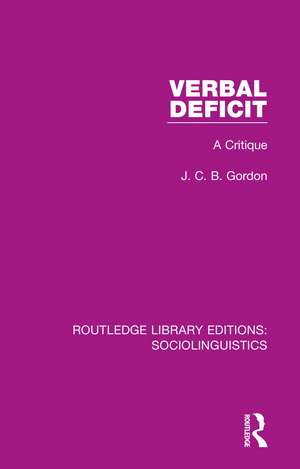Verbal Deficit: A Critique: Routledge Library Editions: Sociolinguistics
Autor J. C. B. Gordonen Limba Engleză Paperback – 25 feb 2020
| Toate formatele și edițiile | Preț | Express |
|---|---|---|
| Paperback (1) | 218.38 lei 43-57 zile | |
| Taylor & Francis – 25 feb 2020 | 218.38 lei 43-57 zile | |
| Hardback (1) | 500.55 lei 43-57 zile | |
| Taylor & Francis – 3 oct 2018 | 500.55 lei 43-57 zile |
Din seria Routledge Library Editions: Sociolinguistics
- 34%
 Preț: 2517.81 lei
Preț: 2517.81 lei -
 Preț: 323.23 lei
Preț: 323.23 lei -
 Preț: 315.77 lei
Preț: 315.77 lei -
 Preț: 323.23 lei
Preț: 323.23 lei -
 Preț: 323.23 lei
Preț: 323.23 lei -
 Preț: 207.06 lei
Preț: 207.06 lei -
 Preț: 323.23 lei
Preț: 323.23 lei
Preț: 218.38 lei
Nou
Puncte Express: 328
Preț estimativ în valută:
41.79€ • 43.74$ • 34.78£
41.79€ • 43.74$ • 34.78£
Carte tipărită la comandă
Livrare economică 31 martie-14 aprilie
Preluare comenzi: 021 569.72.76
Specificații
ISBN-13: 9781138352872
ISBN-10: 113835287X
Pagini: 180
Dimensiuni: 138 x 216 x 15 mm
Greutate: 0.45 kg
Ediția:1
Editura: Taylor & Francis
Colecția Routledge
Seria Routledge Library Editions: Sociolinguistics
Locul publicării:Oxford, United Kingdom
ISBN-10: 113835287X
Pagini: 180
Dimensiuni: 138 x 216 x 15 mm
Greutate: 0.45 kg
Ediția:1
Editura: Taylor & Francis
Colecția Routledge
Seria Routledge Library Editions: Sociolinguistics
Locul publicării:Oxford, United Kingdom
Public țintă
Postgraduate and UndergraduateCuprins
Introduction 1. Differential Educational Attainment 2. ‘Classical’ Verbal Deficit Theory 3. Bernstein’s Sociolinguistic Theory 4. Challenges and Alternatives 5. Verbal Deficit Theories in Context. Conclusion and Prospect. Appendices
Descriere
Originally published in 1981. This critique considers verbal deficit theories, especially Bernstein's, from a sociolinguistic viewpoint but with attention to the historical and educational context. It concludes that verbal deficit theories are educationally damaging, and proposes instead a linguistic ‘difference’ theory.
